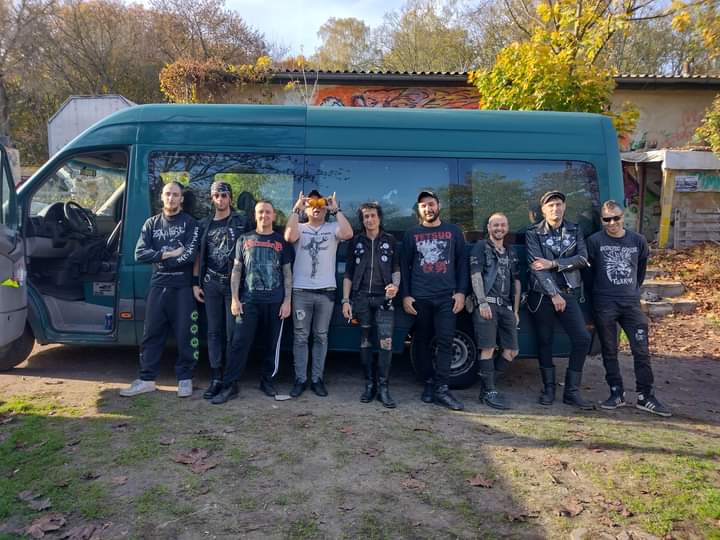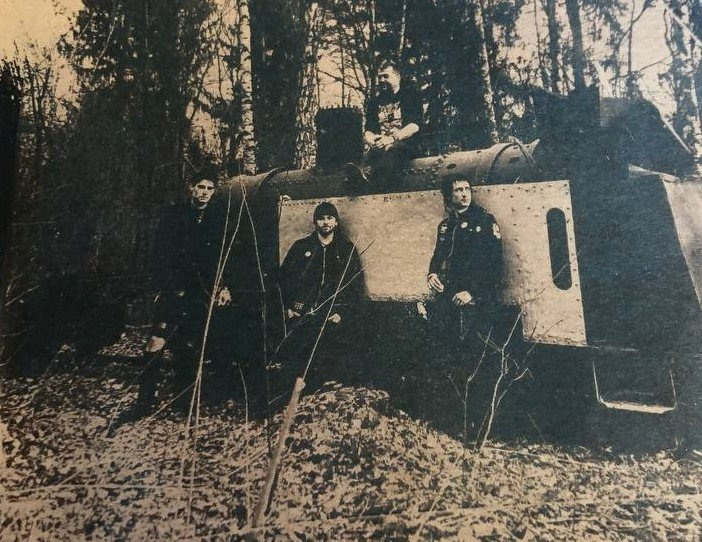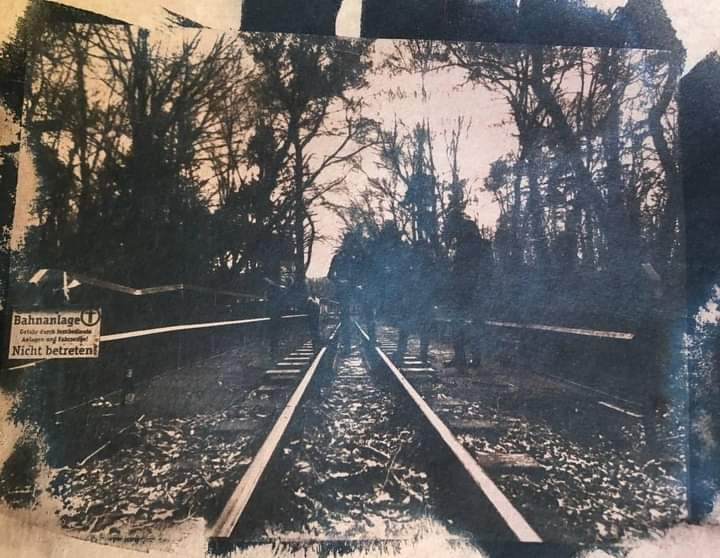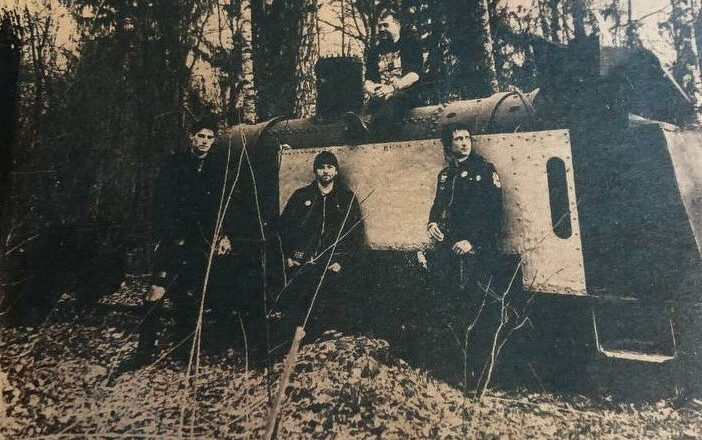To the thundering cry of “crust is alive,” Terminal Filth burst onto the scene with their barbaric, apocalyptic and annihilating stenchcore that spares nothing and no one, a rusty blade aimed at the throat of a future that no longer exists.
After having told you about Death Driven, their first recording effort, a few weeks ago, today I finally publish the interview I had the pleasure to do with these four Berlin punks in which they talk obviously about crust punk but more generally about their vision of the punk scene and music, far from romanticizing the past or fucking nostalgic bullshit, with a view to making it a real threat again. Because if punk is really dead, then let its carcass collapse in putrefaction!

Hi Franz, hi Terminal Filth! I am writing these questions a few days after your gig at Black Inside in Lonate Ceppino, the last date of your tour together with Motron. How are you guys feeling? How was this tour and how did you get along with the bands and the situations you experienced?
First, thanks a lot for the space and for the opportunity to talk more about Terminal Filth. The tour was great indeed and we are very satisfied, on all levels. We felt welcomed everywhere and the crowd reaction to the music was enthusiastic. We couldn’t have a better time together with the guys from Motron and we really had a lot of fun on the road with them! Furthermore, closing the tour with the show in Lonate Ceppino was a blast! After returning to Berlin, we are ready to keep working on our stuff with a lot of memories to cherish. Great fun, great bands, great people altogether!
The name you have chosen blatantly betrays your musical reference points, so why the choice of a name like Terminal Filth? Did you not think it might be an all too obvious name, or do you not care about any of that?
Let’s put it like this: of course, the name is an explicit, even obvious reference to Deviated Instinct. However, our initial purpose was indeed to pay tribute to a whole genre, to a whole way of conceiving and perceiving music as a means of expression – beyond countries and boundaries. Now, in retrospect, we can also read in the name Terminal Filth much more: namely the fact that a whole subculture – which has often been considered as transitory and not to be taken seriously – has now proven to be, in our eyes, a lasting counterpole to a society that we refuse. Or, better, an otherness, a new way of envisaging the world and existing in it.
Of course, that doesn’t mean that we naively see a “punk society” as an accomplished utopistic project. But we try each and every day to rethink our own cultural and social constructions, our rules; and ultimately, to care, and critically reflect upon the world surrounding us. The name “Terminal filth” may well represent from this point of view not only a critique to the “filth” that surround us, but also a reference that last cell of humanity, a filthy remnant which cannot be categorized or, quite simply, put into words – and thus compels us to express it into noise and screams. We think that this form of ambivalence is quite significant in the name that we have chosen. And in a world which “makes use” of everything, the fact that some things may be useless, or unusable, seem quite important to us too.
In addition, you formed the band in the midst of the Covid-19 pandemic, an extremely difficult time for so many in terms of health, but also and especially psychologically and materially. What difficulties did you have and had to face in forming Terminal Filth at that time?
Actually, the first practice sessions that the band did were shortly before January/February 2020, but we can surely say that the most important developments as a band were made during the two years of the Covid-19 pandemic. We were very lucky in this respect: we have our own practice room in a remote area of Berlin, a place which we pretty much always had access to. It is also the place where we recorded our first demo tape – “The Plague Sessions”. From that point of view, we didn’t have to face many challenges, but of course we had to confront ourselves with the restrictions and make the best out of it.
What does it mean to you to play stench-crust punk today in 2022? What is the spirit and attitude that leads you to play this genre? Most importantly, a “stupid” and provocative question: does stenchcore exist and if so, how would you define it?
For us, we would say, it means foremost to create a new way to stay together, to interact and confront ourselves, while creating something that may be meaningful not only for us but also, perhaps, for someone else. In a more precise sense, we try to celebrate and reinterpret with our own means something that helped us to grow as individuals, something that we love and allowed us to make sense of our lives – or at least, contributed to. But the spirit and the attitude? As concepts they don’t exist on their own, they always must be constructed and rethought. They have rather to do with individuals and their individual way to face life with all its problems, challenges, and adventures. For us it does exist a sub-genre that may be called stench-core but at a certain point it may be irrelevant, because what ultimately matters for us the most is that music may convey a certain feeling, a certain energy – that it may create a sort of soundscape. And that, of course, within the specific punk aesthetic.

You are from Berlin, what can you tell us about the more politicized and militant German punk scene in general and about your city? What are currently the most active, combative, and viable realities, both at the level of squats, social centers and collectives and bands?
Compared to Italy, there are surely many more different important realities relentlessly active throughout the city: places as diverse as Köpi, Kastanienkeller, Autobahn, or Subversive, many different Wagenplätze… just to name a few, but the list goes on and on. In recent years, we unfortunately have seen an exacerbation of repressive strategies from the state, which constantly threaten the existence of these places. But the often ignored and anonymous dedication of the people involved is really the fuel behind all these projects. The same goes as far as bands are concerned: tons and tons of bands are currently active in Berlin, and to mention only a few of them would mean to forget at least ten times as many noteworthy projects.
You have finally released, via Agipunk, your first album “Death Driven.” How did this album come about? What inspired you from a personal point of view and also from that of the current socio-political context in writing the music and lyrics?
We’ll be forever thankful to Koppa and the other members of the Agipunk crew for believing in us and for taking the risk to release the record of a band that is basically unknown! We did not expect anything like this, to be frank with you, and the result shall be available soon enough (we can’t wait!).
Regarding “Death Driven:” The songs included in the record were written in a time span of approximately two years, and deal with many different sociopolitical and existential themes. There are songs thematically more in line with the stench-core/crust punk aesthetic framework – such as “Into the Stillness” and “Come and See,” in which the topic of war, death, and oblivion are addressed. Or “The Demon-core,” a song in which we talk about the Los Alamos Laboratory nuclear experiments and the two mortal incidents that occurred there on August 21, 1945, and May 21, 1946. But there are also songs like “A Voice from Beyond” and “The Deepest Wound:” there, we try to create a soundscape where more personal questions and specters can be summoned.
In this respect, even though each song seems to be quite diverse from the other, at least to our eyes, one common topic runs like a red thread through the whole record: the self-destructive drive within the humankind. “Death driven” is in that sense an allusion to Freud’s theory of the death drive – which is, still as of today, one of the most controversial concepts of psychoanalysis.
On the album there is a track like “Come and See” that features a part played on violin. If not for genres like “neocrust” or bands like Morrow, it is an extremely unusual choice for an old-school stench-crust punk band. How did the idea of adding the violin in that track come about and what do you think it gives that track extra?
That was not planned since the beginning. However, as we were writing that song, we got quite close with our friend Maria, who happens to be not only a talented tattoo artist, but also a great violin player. One day we were jamming in our practice room, and we decided to play something together: we immediately tried “Come and See”. After a couple of attempts, the melody came out straight away, as if it had already been written, somewhere in her mind: we thus decided to keep it and to record it. Furthermore, “Come and See” is inspired by the Belorussian war movie – literally a punch in the face! – with the same title (“Idzi i hliadzi”, 1985): the melancholic atmosphere created by the violin track fits perfectly and provides something unique in our opinion. Unfortunately, Maria isn’t often in Berlin, and we could perform the song live with her only a few times. That’s basically the story behind it.

Borrowing the motto of Profane Existence, I believe that punk can and should once again become a threat to this existing that oppresses, represses, and exploits every day. I am curious to know what your stance is towards the idea that punk can be a concrete means to change things around us, or if you think instead that the “insurgent” and antagonistic charge of punk no longer has that impact and importance as in the past.
Let us spice our answer up with a bit of a provocation. The idea that punk has lost its charge, its political and corrosive value or that it can no longer have the same impact and importance of the past can also be interpreted as a form of nostalgia with regards to the past, a sort of melancholia related to the fact that time passes, we grow old, die, and there is no fucking thing we can do about it. The motto “punk is not dead” stinks like nostalgic bullshit! If punk must be a threat again, we should stop treating with excessive reverence the past image we constructed of it and start questioning it in a new critical manner – or just simply see it “as it was”: a bunch of ordinary people doing extraordinary things! The best way in which we can pay tribute to past generations of punks is not by putting them on the pedestal, but rather by pursuing a critical discourse they did not entirely start either, but rather received and pushed forward in new ways. May punk be dead, then, so that we can start rethinking it, putting into question punk itself, instead of closing our eyes to the many, serious problems that are present within the punk scene too! May punk die over and over again, so that we can reinvent it and make of it a new, dangerous, threatening thing: because only if – perhaps – something is mortal can new generations change things. May thus the carcass of punk collapse in putrefaction, so that music and ideas continue in new forms and shapes!
What are the future plans for Terminal Filth? Do you already have more dates and tours planned to support the release of Death Driven?
We are planning many things for next year, concerts asides. We will go back to the recording studio in February to record a new 4-tracks EP. Furthermore, we will probably organize a new European tour towards September 2023.
We have come to the end of the interview my dear Terminal Filth, add what you want in this space and thank you again for accepting and willing to answer these questions. See you soon, make stenchcore a threat again!
We just want to say thanks a lot for the interesting questions, for your support, and for the space to share our thoughts and reflections!

